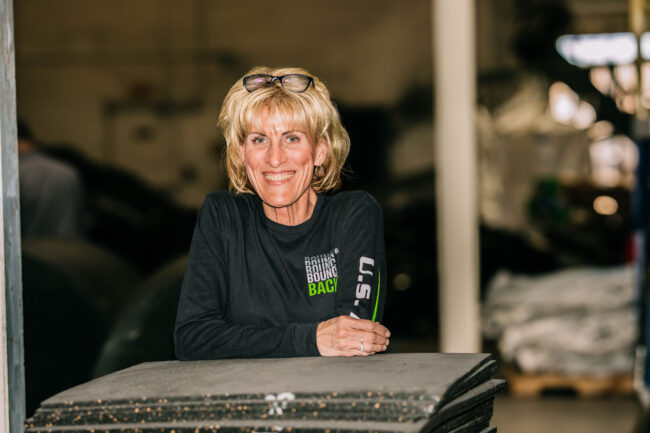
Hiring and employing second chance workers has its challenges, but it’s possible to make the process run more smoothly.
One way to do this is to hire a staff psychiatric rehabilitation counselor to work with these employees and help them transition to the workforce and be successful. And U.S. Rubber Recycling in Colton, Calif. near Los Angeles has done just that.
The company manufactures sports flooring, acoustical underlayment and vegetation control matting. And 45 of the company’s 55 employees were previously incarcerated for convictions that range from manslaughter and first- and second-degree murder to assault and major drug convictions.
At one point, Jeff Baldassari, the company’s president and CEO, knew he needed some help with these employees, and Nancy Lambert contacted him to see if she could offer her services. Lambert, who has a master’s degree in psychiatric vocational rehabilitation counseling and was a former Federal parole and probation officer among other positions, proved just the type of person that Baldassari was looking for.
He hired her to come in one day per week, and in October 2021, she became the full-time human resources manager/psychiatric rehabilitation counselor.
Position of psychiatric rehabilitation counselor is multifaceted
And here’s what she does.
Lambert is usually the initial contact for job applicants. They first fill out an application. Then Nancy interviews them and sometimes has to counsel them on actually how to apply.
“If they just put their name and that’s it, I’ll call them or email them and say, ‘Thank you for applying to US Rubber. Please complete the application.’ Sometimes they email back and say, ‘What do you want me to put down?’ I see that they’re terrified because they just got out of prison. They say they haven’t worked, and I say, ‘Did you work in prison?’ And they say, ‘Of course.’”
“I’ll teach them about O*Net and how to look up what they did and how to write it up. I’ll say, ‘You worked in the kitchen. What did you do? You were a sous chef. You had these duties. Write them down.’ They don’t have to put Folsom Prison, just put the city where they were incarcerated. And they should never, ever lie.”
If they don’t know anything about the company, she tells them, “I’m going to hang up and you’re going to review what we do and call me back.”
That first level interview is always over the phone. “I don’t see them, and I don’t want to. The reason is some of the guys are kind of scary looking. Counselor or not, we all have our biases. We don’t mean to, but we do,” Lambert says. “Some of the tatts aren’t particularly pleasant. So I don’t want to see them. And when they see me, they might say, ‘this white person, what does she know?’”
Lambert asks questions to find out the candidate’s background
She finds out things about the candidates by asking questions to find out their situation. For example, “I tell them that I ask everybody this question, so you’re not special. I say, ‘Tell me about your learning disability.’ Eight out of 10 times there’s a learning disability.
The interview takes between one and two hours. And if she can’t hire them, she has a list of 50 other employers and various resources to refer them to. The applicants are referred by a halfway house and current employees and sometimes they just call or walk in.
After talking to Nancy, about five out of 20 people proceed to the next step, which is an interview with the hiring manager. She doesn’t mention their background but tells the manager about the person’s character and transferable skills.
U.S. Rubber Recycling doesn’t do background checks. Instead, Lambert finds out what she needs to know by careful questioning.
Once they’re hired her work continues. She greets each person most days, she says, and takes in cookies and hands them out individually.
Lambert looks for clues that something may be amiss. “I get to learn about each person individually. I look at them beginning at their work boots. If they don’t wear boots, why not?” she asks. “Are you clean, and if not, why not? One guy who wasn’t said he was homeless, and I knew that we had to find him a place to stay.”
She carefully checks out how they look. Are they pale, tired or overheated. “Their eyes can tell a story,” she says.
In order to keep track of what’s going on, Lambert checks in with at least two employees every day. Rather than call them into the office, she goes out on the floor, pulls people away and takes a walk with them to discuss any issues they may be having.
Lambert is on call 24 hours per day but rarely gets calls late at night.
Employees are taught to be kind and respectful
She teaches employees to be kind and respectful not only to other people they work with but those in their lives outside of work.
“I’ll explain that this is your lab, your training ground where you get to make all of the booboos. What you learn here is what you take out there, so take advantage of that,” she says. “You’re learning how to work with each other, and you’re taking that skill set and you’re transferring that to the outside. If you’re having issues in here, work it out in here.”
Although most of Lambert’s work is creating informal one-on-one relationships with the formerly incarcerated workers, she refers people to nonprofit organizations if they need help. She also set up a program to teach financial literacy. As a result, people were able to set up checking and savings accounts and discovered new ways to work with money.
“Our job is to help them succeed in their personal development, financial management and in their personal lives,” she says.


